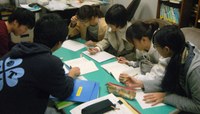Cafe
![]()
1. University is for leisure?
 Who came up with that? While we can’t say anything about the universities (or departments) that people who agree with that statement attended, students who believe that and enter the Department of Mathematical Sciences are sure to be disappointed. Half-hearted studies for entrance examinations will not suffice in this department, and there are no cram schools or supplementary schools that can teach the knowhow needed for your studies. Some students are forced to take a year off from university as they learn for themselves how to study.
Who came up with that? While we can’t say anything about the universities (or departments) that people who agree with that statement attended, students who believe that and enter the Department of Mathematical Sciences are sure to be disappointed. Half-hearted studies for entrance examinations will not suffice in this department, and there are no cram schools or supplementary schools that can teach the knowhow needed for your studies. Some students are forced to take a year off from university as they learn for themselves how to study.
2. The creation of the “Myosa-bo”
While professors at Yamaguchi University have long held office hours when students can visit their office to ask questions, unfortunately this system does not always function effectively. Associate professor Isao Kikumasa wanted to create a space where students could talk openly about their questions regarding mathematics and learning. To that end, he established the learning consultation space. Its doors are open to students for two hours each weekday in the afternoon and staffed with two graduate students or fourth-year undergraduate students for consultation. In addition, one instructor is always available for any consultations that student advisors cannot handle.
3. Busy consultants
Currently, ten graduate students and fourth-year undergraduate students are registered as consultants, and they answer consultations with pride and passion. Over 130 consultations were held last year. These consultations covered not only the Department of Mathematical Sciences, but also included students from other science departments and faculties. It’s not uncommon for consultations to continue long into the night well after the doors to the tea room have closed. One consultant noted that this is because “everyone enjoys this job”. Consultants work hard to give guidance and support to struggling students.
4. The source of the name
In the former curriculum, there was a course for second year students called “Mathematics Research Seminar”. Students in the seminar were divided among professors, and received individualized guidance during class time using answers to graded quizzes. This individual guidance was referred to as “Tea Time”, and we discussed calling the learning consultation space the “Tea Room”. At the time there was a Chinese language course on NHK with a segment called “Myo-sabo”, and we borrowed the name. Our students often call the room the “tea salon”. The “Tea Time” system is still continued in “Introduction to Mathematical Sciences Seminar” and “Fundamental Mathematical Sciences Seminar” in the current curriculum.